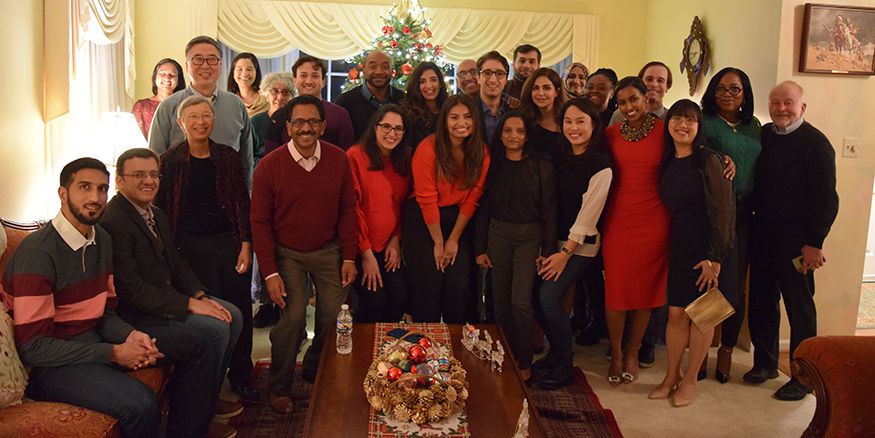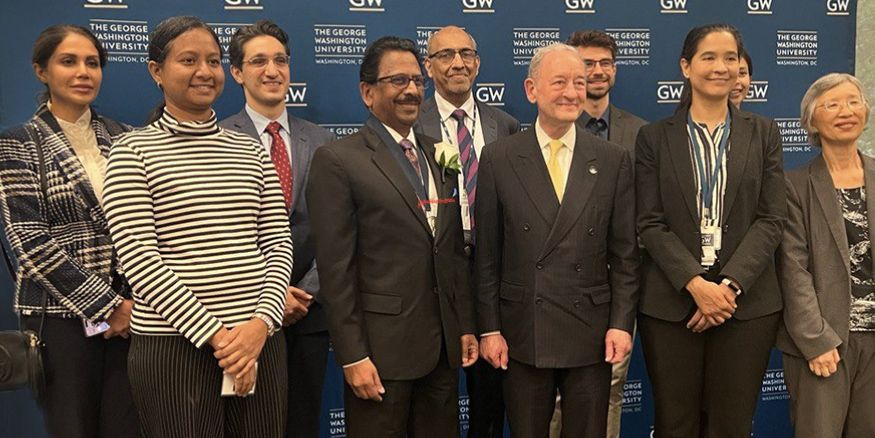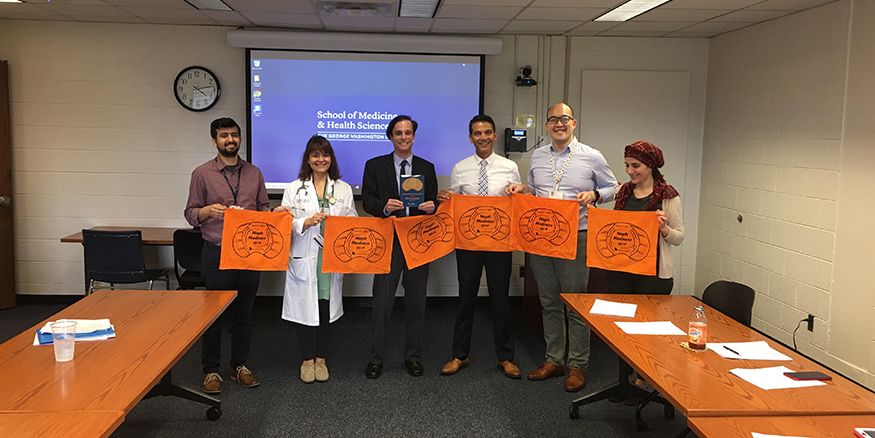Overview
Dear Future Nephrologist:
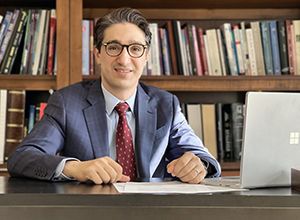
Welcome to the George Washington University (GWU) Nephrology fellowship program!
Located in the heart of the Nation’s Capital, Washington DC, our program offers diverse and cutting-edge training opportunities at the George Washington University Hospital and Washington DC VA Medical Center.
With a glorious history of more than 200 years, GW has contributed to landmark discoveries and clinical landmarks. The division of kidney diseases and hypertension has a rich history of leading the world in the field, in utilization of kidney biopsy, dialysis therapies, acute kidney injury, HIV-associated kidney disease, cardio-renal syndrome, inflammation, non-coding RNA and gut microbiome. We have participated in several land-mark trials in nephrology and hypertension.
Our program provides a comprehensive experience to fellows in the evaluation and management of acute kidney injury, chronic kidney disease, glomerular diseases, fluid and electrolyte disorders, critical care nephrology and dialysis therapies in acute and chronic settings. Our nephrology fellows have access to state- of -the -art training at the largest peritoneal dialysis program in the city and growing home hemodialysis programs.
Our trainees gain hands-on experience with extracorporeal therapies including continuous renal replacement therapy- extracorporeal membrane oxygenation (CRRT-ECMO), plasmapheresis, leukapheresis and red cell exchange.
With a growing kidney transplantation program along with liver and pancreas transplantation programs, GW nephrology provides the opportunity to our fellows to gain the experience needed to care for transplant patients.
Fellows also have an unique opportunity to learn from world renowned clinical experts at the National Institute of Health. This experience will enrich the fellows with unique knowledge about rare kidney diseases, onconephrology and patients receiving experimental therapies for renal or non-renal conditions. Fellows are encouraged to attend educational sessions at the NIH during the rotation.
Other notable training opportunities include, management of polycystic kidney disease, kidney precision medicine, onco-nephrology, management of complex hypertension, life style medicine and stone disease.
Leveraging more than a decade of experience in kidney ultrasonography, our nephrology fellows will learn outpatient kidney ultrasound as well as inpatient point of care ultrasound including lung ultrasound for volume assessment and will also be trained in basic “echocardiography for nephrologists”.
The clinical experience is complemented by a rigorous conference schedule all year delivered by inhouse expertise and visiting professors from across the world. Trainees will be taught how to critically appraise the scientific literature, design research projects, develop experience with manuscript writing, and as well as present their scientific work at regional and national meetings.
Robust discussions of clinical cases in nephrology and transplantation are held with biopsy interpretations at joint conferences in nephro-pathology with faculty from the Mayo Clinic. We work collaboratively with the cardiology division in managing patients with co-existing kidney and cardiac disease.
Dedicated teaching time for point of care ultrasound training is built into the curriculum throughout the year. After completing fellowship, fellows will be well prepared for a career in nephrology across several domains including clinical practice in the community, academic practice, medical education, procedural expertise, leadership roles in business and the industry, as well as several other developing roles for nephrologists in interdisciplinary spaces. Several alumni of the GW Nephrology program have gone on to pursue further sub-specialty training in transplantation, academic careers as well as in thriving private practice. Some of our former fellows are currently faculty members in GW, Yale University, UCLA and UCSF. Some are in large group practices and successful solo practitioners. As GW nephrology family, we remain committed to our fellows even after graduation.
It is an exciting time to become a nephrologist with increasing awareness of the epidemic of chronic kidney disease has funneled unprecedented resources into the field leading to several innovations in discovery science and approval of many new drugs for treating kidney diseases. With this optimistic note, we are delighted to invite you to explore the Division of Kidney Diseases and Hypertension at GW nephrology fellowship and become part of the GW nephrology family.
All the best,
Ehsan Nobakht MD, FASN
Associate Professor of Medicine
Director, Nephrology Fellowship Training Program
George Washington University, Washington DC
imfellowships@gwu.edu
Structure
The principal clinical training centers are at the George Washington University Hospital and the Veterans Affairs Medical Center. The structure over the 24-month program is as follows:
|
10 to 12 months |
Inpatient rotations at George Washington University and VA Medical Center |
|
4 to 5 months |
Transplant Medicine Service |
|
5 to 6 months |
Renal biopsy Outpatient hemodialysis, Home hemodialysis and Peritoneal dialysis Specialty ambulatory clinics
With options for Cardiorenal, Precision Medicine, Stone Disease and Future Integrative Medicine Research
|
Training Sites
- George Washington University Hospital
-
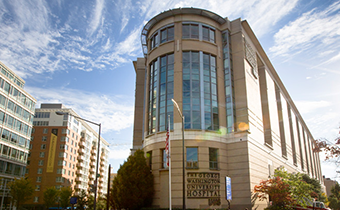
The George Washington University Hospital (GWUH) is located in the center of Washington D.C., the state of the art tertiary care 385 bed hospital offers a wide range of nephrology services including treatment of complex acute kidney injury, continuous renal replacement therapies (CRRT), conventional as well as extended hemodialysis dialysis therapies and peritoneal dialysis.
It is the referral site for Extracorporeal membrane oxygenation (ECMO) and for extracorporeal therapies including plasmapheresis, exchange transfusion and leukapheresis. The kidney transplant program is expanding to include pancreas and liver transplant program. The robust cardiology and cardiothoracic surgery programs offer an opportunity to work on complicated acute kidney injury cases and cardiorenal syndrome.
Fellows will learn to treat chronic kidney disease, vascular access problems, fluid-electrolyte disorders, and glomerular diseases. Kidney biopsies are performed with assistance from dedicated radiology faculty. Fellows have an opportunity to work with the interventional radiologists to learn vascular access management. We work collaboratively with our urology colleagues to care for patients with nephro-urological problems. The rotations are complemented by a rich outpatient clinic experience.
- The Washington DC Veterans Affairs Medical Center (DC-VAMC)
-
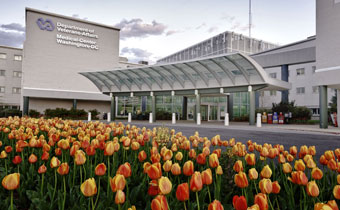
The Veterans Affairs Medical Center in Washington, D.C. is a level 1A facility which provides comprehensive medical care for the veteran population in the D.C. Metropolitan area. The Renal section of the Washington, DC VA has 4 full time nephrologists on staff who hold faculty appointments at George Washington University. The section performs dialysis in the inpatient and outpatient setting at the medical center including: chronic intermittent hemodialysis, CVVHD/F (Prismaflex machines), SLEDD (Tablo machines) and peritoneal dialysis (manual and cycler). The section cares for the entire spectrum of CKD in the outpatient and inpatient setting including kidney transplant recipients. Kidney transplants are performed at the VA in Pittsburgh but all pre-transplant evaluations and post transplant care is under the DC VA Renal section.
The Renal Care Center located in building 6 of the Medical Center was built in 2006 to include a chronic hemodialysis unit for approximately 60 individuals as well as a chronic peritoneal dialysis unit, conference room, two patient exam rooms, and offices for all 4 nephrologists, a renal dietitian and renal social worker. There is also a dedicated office for nephrology fellows. Important features of Renal Care Center facilities for fellowship training include: dedicated space for urine microscopy, phase contrast microscope with LCD display, ultrasound machine with vascular and abdominal probes (portable to dialysis unit and hospital), full digital library access to a host of journals, textbooks and medical programs such as Up-to Date through VA Intranet. Fellows are invited to participate in specialized hypertension clinic established between the cardiology and renal sections.
GW Nephrology Fellowship Program Highlights
The GW fellowship offers an optimal blend of unique clinical experience, didactics, and research opportunities. Highlights of the program are given below:
- The program has a rich and long- standing history of pioneering nephrology care across renal replacement therapies, chronic kidney disease care and kidney transplantation in the region.
- Trainees will gain exposure to a diverse range of clinical pathology across George Washington University Hospital and the Veterans Administration Hospital. Fellows will also have the opportunity to do an elective rotation at the NIH for exposure to rare cases.
- There are opportunities to train in niche areas such as cardiorenal medicine, onco-nephrology, glomerulonephritis, genetics and precision medicine, kidney transplantation, point of care ultrasound, complex hypertension as well as critical nephrology with dedicated faculty expertise in these areas.
- Rigorous academic environment with state-of-the-art conferences focused on case discussions, journals clubs, pathology conference in conjunction with the Mayo Clinic and presentations from a wide breadth of invited national experts.
- Highest level of commitment to diversity across gender, race, and background with a collegial, respectful, and very supportive environment throughout training and after through a rich network of alumni. This atmosphere allows trainees to excel in their future prospects including academic medicine, private practice, future sub-specialty training and any other pursuits of interest.
Application Process
Application Information
Applications are only accepted through the Electronic Residency Applications Service (ERAS).
The candidate must register for both ERAS and the National Residency Match Program (NRMP). A candidate who has not registered with the NRMP cannot be considered during the ranking process. It is very important to remember to register.
Requirements for GW Fellowships
Fellowship applicants must have completed three years in an ACGME-Accredited Internal Medicine Residency, and be board-certified or board-eligible.
Required Documents for Complete myERAS Application
- myERAS application
- Curriculum Vitae (CV)
- Personal Statement
- Three Letters of Recommendation (one from the program director)
- USMLE / COMLEX Scores (must have passed Steps I-III prior to start of fellowship year)
- Medical Student Performance Evaluation (MSPE)
- ECFMG Status Report for International Medical Graduates (must have certification)
- Licensing Information and Board-Eligibility/Certifications (if applicable)
- Citizenship Status
International Medical Graduates
We can only consider applicants with J1 visas. Please see our GME Visa policy.
IMGs must have completed an ACGME-accredited residency program.
Graduates of International Medical Schools must also be certified by the Educational Commission for Foreign Medical Graduates (ECFMG).
If you have any questions, please contact Lisa Horvath, fellowship coordinator, at 202.677.6056 or imfellowships@gwu.edu.
